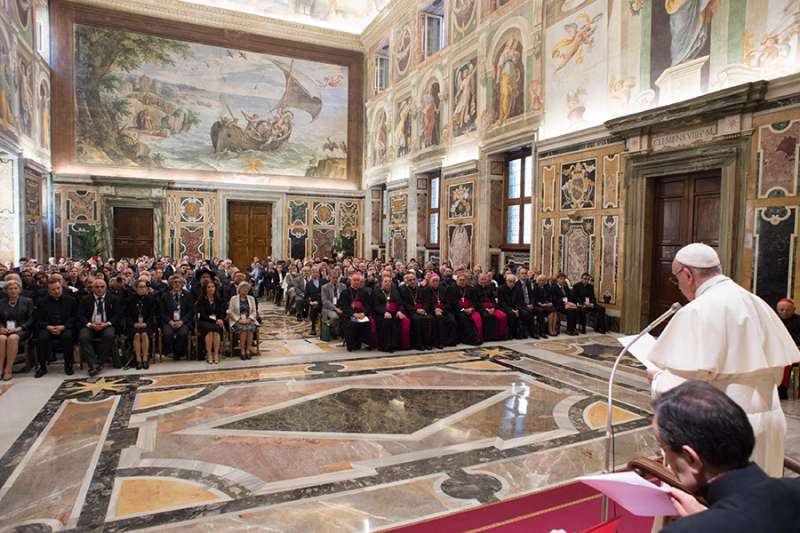A healthy human ecology begins with a respectful and holistic view of the body as God created it, Pope Francis told participants of the 24th General Assembly of the Pontifical Academy for Life.
“In a holistic view of the person, it is necessary to articulate with ever greater clarity all the concrete connections and differences in which the universal human condition dwells and which involve us, starting from our body,” the pope said.
Pope Francis delivered the address on Monday at the beginning of a three-day assembly hosted by the Pontifical Academy of Life at the Vatican. The assembly, focused on human ecology, reflected on the theme, “Equal Beginnings. But then? A global responsibility.”
In his comments, the pope discussed the importance of understanding the human body as a starting point for further reflections on human ecology.
“The acceptance of our body as a gift from God is vital for welcoming and accepting the entire world as a gift from the Father and our common home, whereas thinking that we enjoy absolute power over our own bodies turns, often subtly, into thinking that we enjoy an absolute power over creation,” he said, citing his 2015 encyclical Laudato si.
“Learning to accept your body, to care for it and to respect its fullest meaning, is an essential element of any genuine human ecology.”
This acceptance of the body also recognizes the differences between persons, he said.
“It is therefore necessary to proceed with a careful discernment of the complex fundamental differences of human life: of man and woman, of fatherhood and motherhood, of filiation and fraternity, of sociality and also of all the different ages of life.”
“Valuing one’s own body in its femininity or masculinity is necessary if I am going to be able to recognize myself in an encounter with someone who is different,” he said, again quoting Laudato si.
In recognizing the inherent dignity of the human person, the pope said, we learn to see the need to defend the sanctity of all the vulnerable, including the unborn, elderly, sick, impoverished, and trafficking victims.
“When we deliver children to deprivation, the poor to hunger, the persecuted to war, the old to abandonment, do not we ourselves, instead, do the ‘dirty’ work of death? Where does the dirty work of death come from? It comes from sin,” he reflected.
“Evil tries to persuade us that death is the end of everything, that we have come to the world by chance and we are destined to end up in nothingness. Excluding the other from our horizon, life folds back on itself and becomes a consumer good.”
With this in mind, the Pope said, a Christian-inspired bioethics “will engage with more seriousness and rigour to defuse this complicity with the dirty work of death, supported by sin.”
“This bioethics will not take illness and death as a starting point in deciding the meaning of life or defining the value of the person,” he continued. “It will rather start from the profound conviction of the irrevocable dignity of the human person, as God loves him, the dignity of every person, in every phase and condition of his existence, in the search for the forms of love and care that must be addressed to his vulnerability and fragility.”
Pope Francis encouraged those present to root their understanding of human ecology in a true understanding of human dignity.
“We need to reflect more deeply on the ultimate destination of life, capable of restoring dignity and meaning to the mystery of its deepest and most sacred affections,” he said. “The life of man, enchantingly beautiful and fragile to die, refers beyond itself: we are infinitely more than what we can do for ourselves.”

